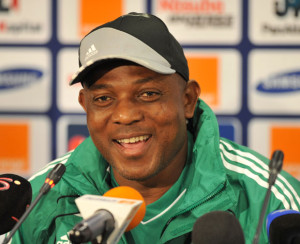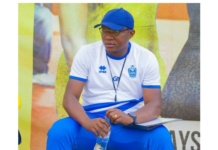Like they did in 1994, Nigeria will arrive at the FIFA World Cup™ in Brazil as African champions, and as they did in the USA, they will be looking to go beyond the group stages. However, with some similarities and vital differences between that legendary team and the current crop, FIFA.com looks closer at the two sides.
The Super Eagles traveled to the USA blooming with a golden generation of players, who in October 1993 secured Nigeria’s first-ever participation at the finals with a 1-1 draw in Algeria that saw the west Africans top their group on goal difference from Côte d’Ivoire. A few months later, Nigeria won their second CAF African Cup of Nations, beating Zambia in the final.
More experience, more expectations
The Nigeria squad at the time lacked the experience of the present team. Many of the players in Clemens Westerhof’s team were just embarking on their careers –
like Jay Jay Okocho (20 at the time), Daniel Amokachi (21) Sunday Oliseh (19) and Victor Ikpeba (21). In fact, the only players who had reached their 30th birthday were the present coach Stephen Keshi and goalkeeper Peter Rufai.
Despite their shock topping of a group ahead of Bulgaria and Argentina, many Nigerians still believe that had the team been just a little bit more experienced, they might have held on to their lead over eventual finalists Italy in the Round of 16 instead of succumbing to the Roberto Baggio-inspired Azzurri.
It seems likely that Keshi will have a side with more guile in Brazil, with several of his players plying their trade for top-notch European clubs. Players such as John Obi Mikel, Victor Moses and Victor Obinna will bring a wealth of experience playing at the highest level with them. The flip side of this is that, unlike the 1994 squad, Keshi and his team will arrive in Brazil with the burden of huge expectations back home.
Even Nigerian president Goodluck Jonathan weighed in heavily, saying in a statement: “With the enormous pool of footballing talent available to the country, the Super Eagles can, with more hardwork, dedication, resilience and further honing of their skills and tactics, fulfill the national dream of being the first African Nation to win the World Cup.”
Keshi’s faith
As they did in 1994 with Clemens Westerhof, Nigeria have a very strong coach in Keshi, but unlike the Dutchman, Keshi has had to deal with a fair number of critics within Nigerian football.
Although he is the only African coach to qualify for the finals with two different countries – he led Togo to Germany 2006 but did not coach them there – he has endured a bumpy ride, prompting him to tender his resignation after winning the AFCON earlier this year, which he subsequently withdrew. Despite this, he has continued along his chosen path of complementing the array of foreign-based stars with locally-based players, and this has, while being criticised by some, resulted in a fierce loyality from his players.
It seems very likely that Keshi’s World Cup squad will – unlike Westerhof’s in 1994 – include a number of Nigeria-based players, and as he showed in South Africa earlier this year, he is not afraid to use them, even if it means benching players who play in Europe. Keshi told journalists after the teams’ group stage exit at the FIFA Confederations Cup this summer that he had no problems listening to constructive ideas from others. “But no one can tell me who to pick and not to select. If the team fails, the coach is responsible. As the coach, it’s my decision and responsibility. For now, the local players have earned the right to be in the team,” he said.
In the USA, there was some conflict within the team, with striker Rasheed Yekini claiming that he was being ostracised on the pitch because his team-mates did not want him to grab all the headlines and also because he was not willing to share the prize money he received as African Footballer of the Year with them. There was also – as is unfortunately so often the case with African teams at major tournaments – a dispute around bonuses.
All of that, though, did not prevent the Super Eagles from being one of the surprise teams of the tournament, who took to the world stage as if they had been born for it. But if their fans were hoping that it was a sign of things to come, they have been somewhat disappointed, as even the golden generation of Okocha, Amokachi et al failed to build significantly on that success. However, two decades on, Nigerians are now looking for this class of players to go where their predecessors have never gone: to the quarter-finals of the World Cup and beyond.









